Cytokinesis
1/41
There's no tags or description
Looks like no tags are added yet.
Name | Mastery | Learn | Test | Matching | Spaced |
|---|
No study sessions yet.
42 Terms
What does a chromosome consist of?
DNA + protein
Whats G-banding?
Type of stain used to see chromosomes
What’re the different types of chromosomes?
Metacentric
Submetacentric
Acrocentric chromosomes
What’re metacentric chromosomes?
Have centromere in centre
(1, 3, 16, 19, 20)
What’re submetacentric chromosomes?
Slight asymmetry
(2, 4-12, 17, 18)
What’re acrocentric chromosomes and what’s a feature of them?
Very asymmetric, short arm has rRNA genes
They cause robertsonian translocations
(13-15, 21, 22)
Explain banding nomenclature
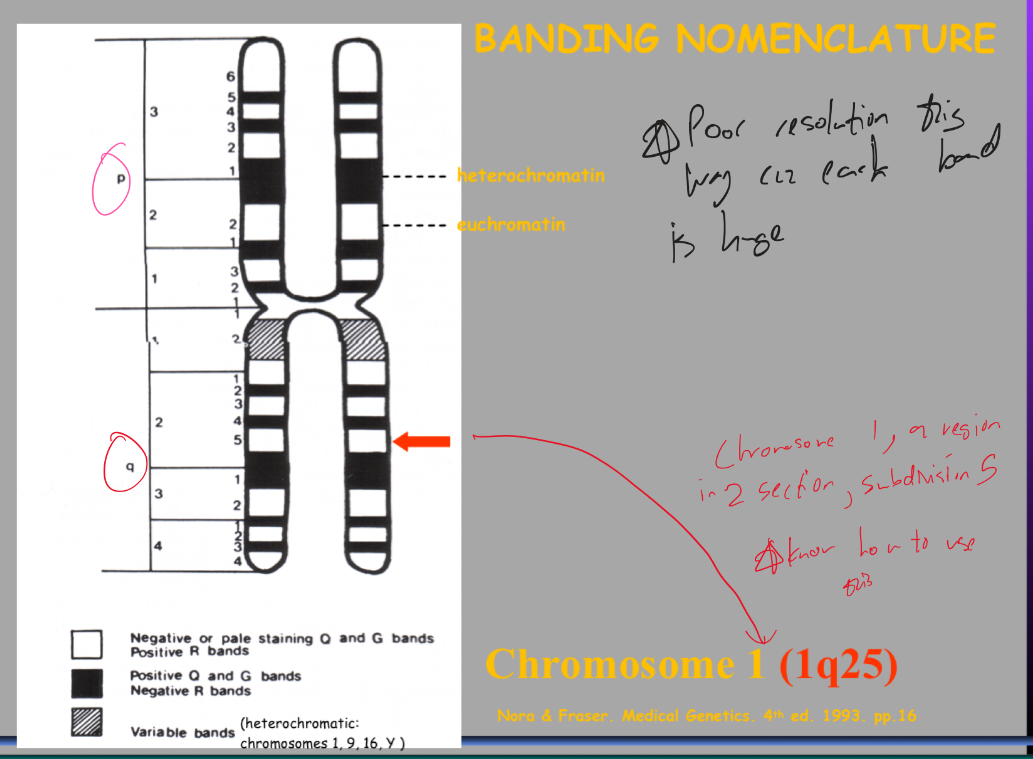
Whats aneuploidy?
Not the correct number of chromosomes (Gain or loss of chromosomal material)
What do aneuploidies rise from?
Non disjunctions: Paired chromosomes fail to separate in mitosis or meiotic anaphase 1, or sister chromatids in meiosis II
Also from translocations
What would (47, XX, +21) mean?
Means individual has 47 chromosomes, is XX, and has an extra chromosome in chromosome 21 (trisomy 21)
What do mitotic non disjunctions cause?
Mosaicism
Whats mosaicism?
Different cell populations in one organism.
We are all mosaicism due to somatic mutations
Whats the difference between mosaicism and chimerism?
Mosaicism: diff cell populations in one organism
Chimerism: Different cell populations from different zygotes that have fused
Explain the mitotic disjunction diagram
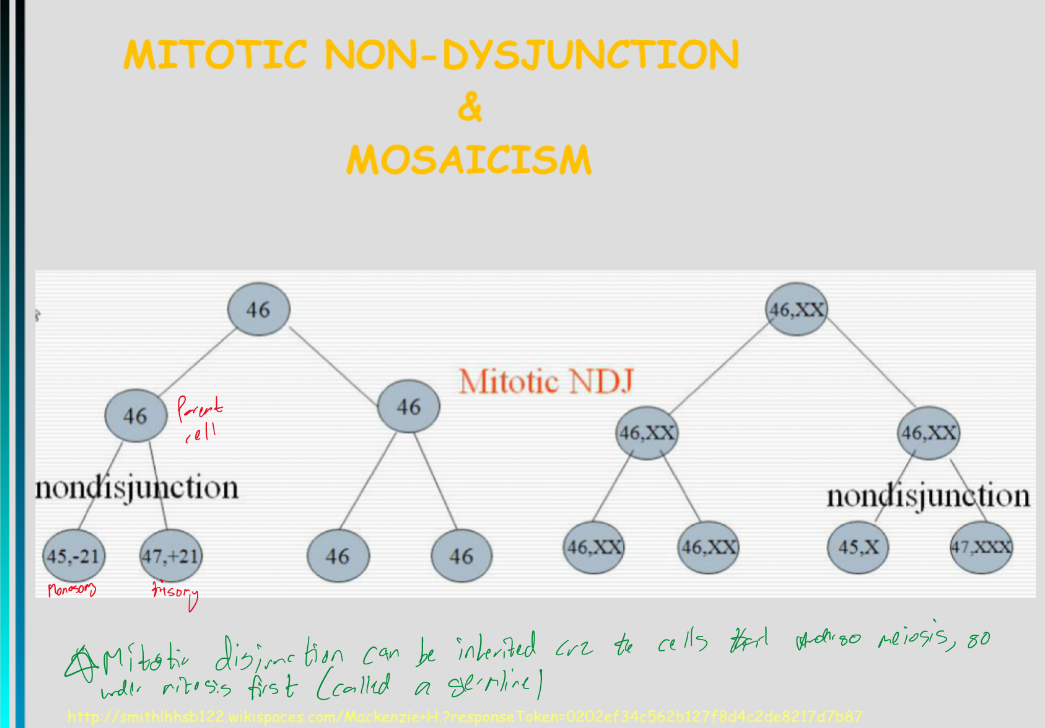
Can mitotic disjunction be inherited?
Yes, cuz the cells that undergo meiosis, go under mitosis first
What can meiotic disjunctions result in?
Can result in gametes that are missing a chromosome or have an extra copy of a chromosome (aneuploidy)
Heterodisomy: gamete has 2 different chromatids
Isodisomy: gametes has 2 of the same chromatids
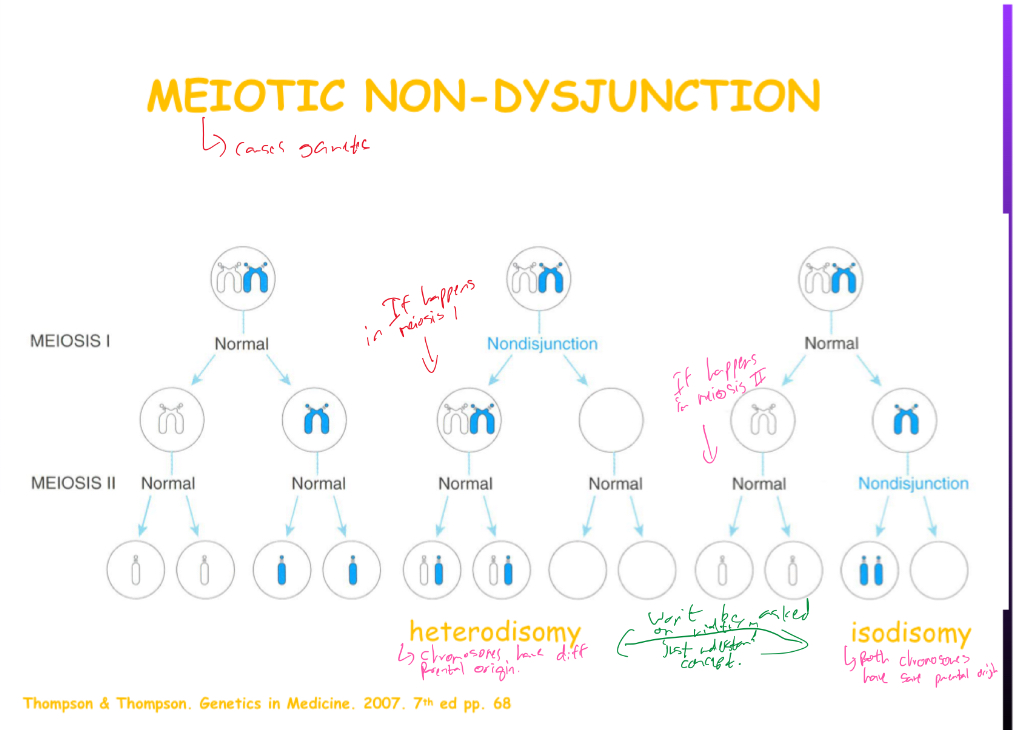
What’re some aneuploidy effects?
Loss of chromosome in early embryonic development is lethal
Monopsony: one copy (autosomal), lethal during embryonic development
Trisomy: 3 copies (autosomal), 13, 18, or 21 are viable. Others are all lethal
What trisomies are lethal and which ones aren’t?
All autosomal trisomies are lethal prenatally except 13, 18, 21
Why are trisomies lethal?
Because of additive gene dosage effects (many CNVs)
Imbalance of expression levels between genes on different chromosomes
What’re the causes of trisomies?
Most are meiotic disjunctions from the parental germline
The rest are inherited from carriers of robertsonian translocations
Whats trisomy rescue?
The loss of the extra chromosome during mitosis. Creates a somatic mosaic for the trisomy that may reduce severity
Explain trisomy 21
Extra copy of Ch 21
About 1:1000 births (common)
Mosaic trisomy 21 often less severe
Delayed physical growth
Altered facial features
Mild to moderate intellectual disability
Acrocentric so robertsonian translocation
Explain trisomy 18
1 in 5000 births
Risks and causes as with Trisomy 21 (but not acrocentric so not robertsonian)
Many intellectual and physical problems
Less common than 21, cuz more severe, more zygotes with trisomy 18 aren’t surviving
Explain trisomy 13
Same causes and risks as trisomy (non disjunctions or robertsonian translocation)
1 in 10,000 live births
Effects more severe than Trisomy 21: Intellectual and physical (polydactyls, holoprosencephaly)
Whats the prognosis of trisomy 13?
Most die within first year
Median survival time is only 12 days
Mosaic trisomy 13 can be less severe, depending when in development the trisomy rescue occurs
When are autosomal monosomies all lethal?
Early in development
Why are autosomal monosomies so sensitive?
Additive effects of many changes in dosage, plus or minus cause effects (when we have a change in a lot of genes it causes issues)
Monosomies can expose heterozygous mutations (LOH): When you lose the good copy of a gene
Why are aneuploidies of X and Y better tolerated than aneuploidies of autosomes?
Because of specializations like X inactivation and cuz Y doesnt do much
What happens if theres an extra X or Y?
Cause only minor problems and normal life-span
What happens if lacking an X or Y?
45, Y is never viable: X is essential
45, X: most miscarry, survivors normal intelligence but infertile
Whats the main idea behind Klinefelter syndrome?
47, XXY
Main problem is infertility
In klinefelter, why is there a phenotype if one of the X’s is inactivated?
There’s a gene dosage effect cuz X inactivation in incomplete for some genes, the inactive X still has a lot of reanscription going on
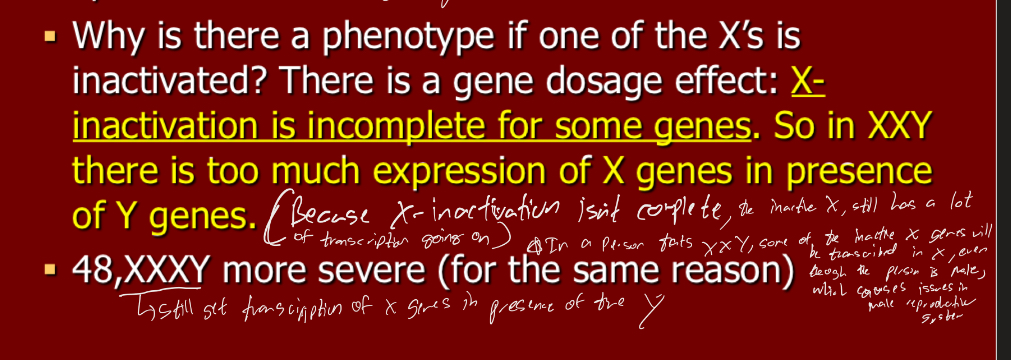
Explain Jacob’s syndrome
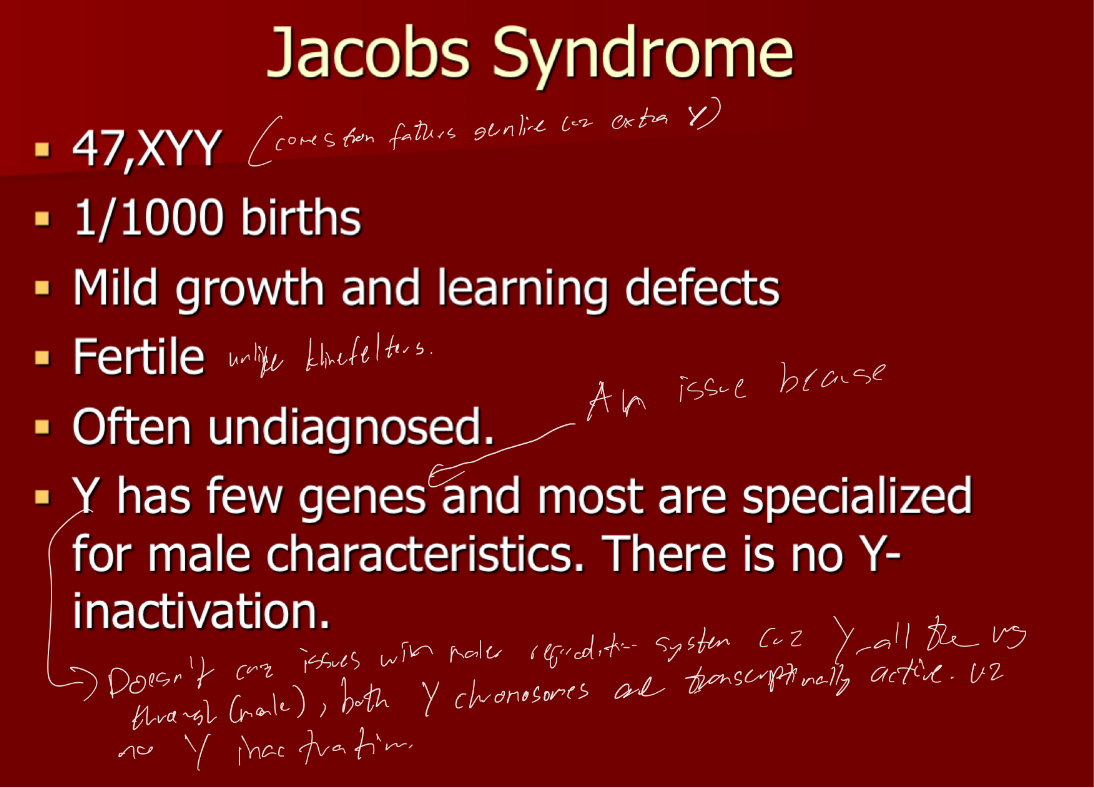
Explain Turner’s syndrome
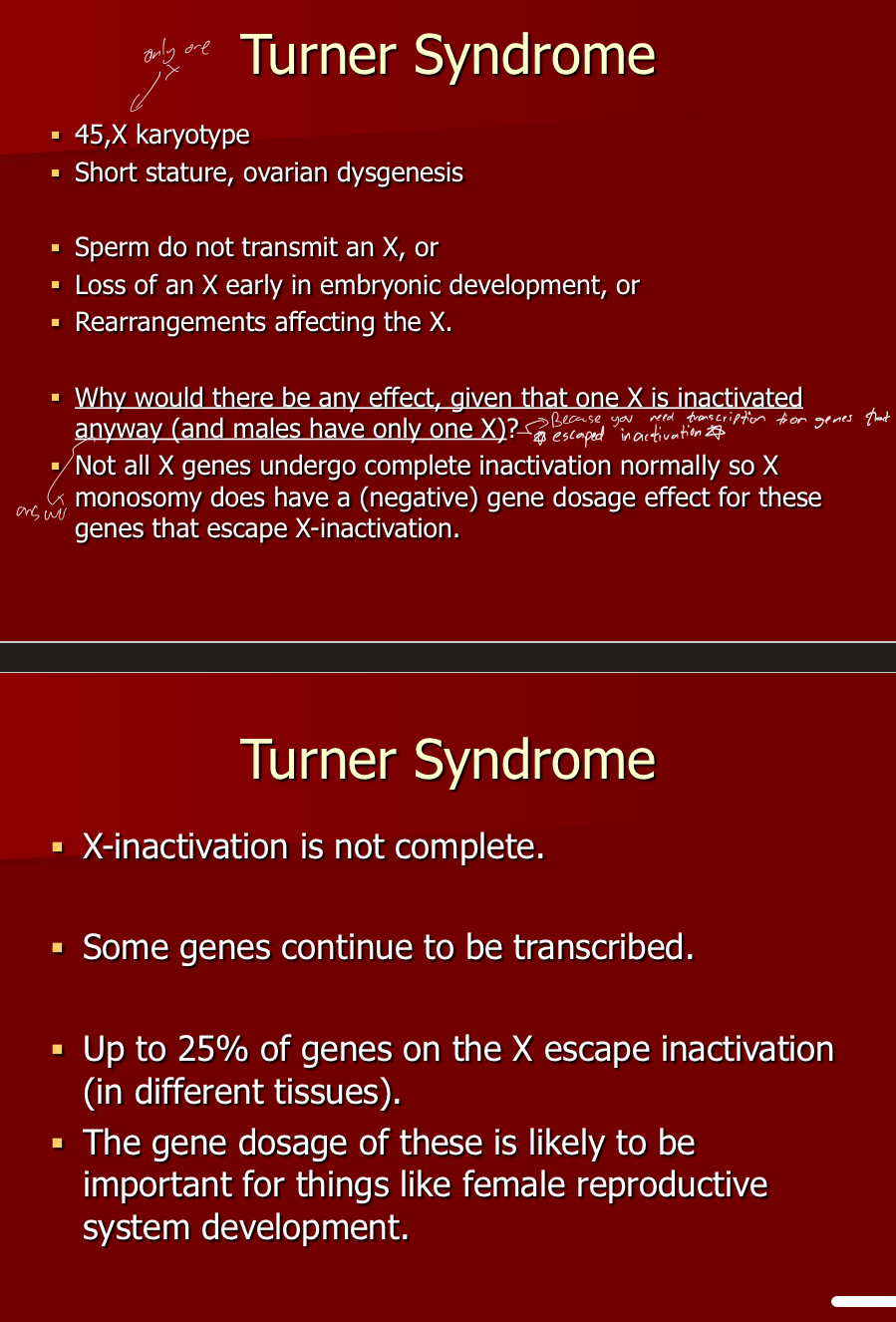
What forms in Turners?
Isochrome
Whats an inversion?
It’s when region of a chromosome is flipped in orientation
Usually don’t cause an issue cuz you have all genetic info, only rlly an issue if break is in an important place, or when they get big and go through meiosis
What’re the 2 types of inversions?
Paracentric: Inversion doesnt include the centromere
Pericentric: Inversion includes the centromere
Explain diagram of paracentric inversions
Explain diagram of pericentric inversions
In terms of translocations an inversions is the problem recombination or segregation?
Segregation
Explain reciprocal translocation
If breakpoint disrupts a genes forms a bivalent
No issue usually swapping between autosomes, but issues swapping between autosomes and sex chromosome
Whats the difference between reciprocal translocation and robertsonian translocation?
Tetravalent during meiosis
Trivalent during meiosis, causes meiosis